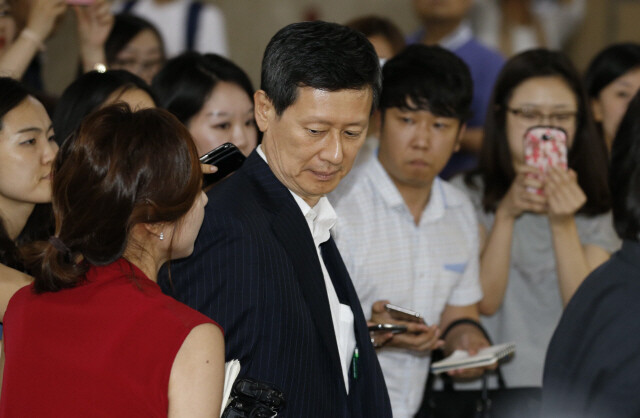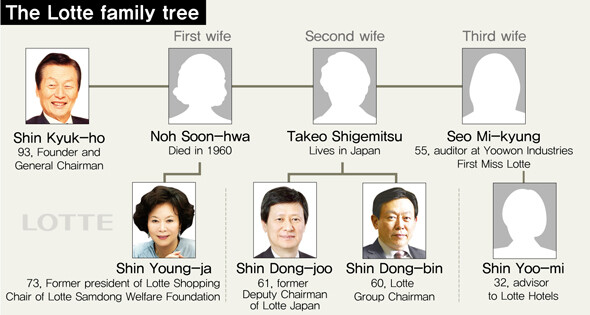hankyoreh
Links to other country sites 다른 나라 사이트 링크
Another chaebol squabble - family infighting a part of Korea’s corporate landscape

A battle for management rights between two brothers at South Korea’s fifth biggest chaebol is drawing renewed negative public attention to the family infighting that has become a familiar part of the country’s corporate landscape.
The latest episode involves Shin Dong-joo, who stepped down early this year from his management position at Lotte Japan. On July 27, he attempted to regain his management authority, citing the wishes of father and Lotte Group general chairman Shin Kyuk-ho. The situation died down briefly a day later after Shin Dong-joo‘s younger brother, Lotte Group chairman Shin Dong-bin, forced their father off the front lines by having him resign his seat as chairman of Lotte Holdings in Japan.

“I cannot apologize enough for the worries and confusion I have caused,” Shin Dong-bin wrote in a July 29 message to group staff and executives.
“The corporate values long upheld by Lotte must not be disrupted simply over personal family issues,” he added.
But many observers in and around the group, noting that the two brothers have similar shares in Lotte Holdings, said the conflict could erupt again depending on the wishes of Shin Kyuk-ho, who owns a share in Lotte Holdings majority shareholder Kwangyoon Corporation.
Many say the unending battles over management rights and inheritances among families in South Korean chaebol passing on the reins the second and third generations stem from their regressive management succession practices. Among the top ten of groups with a founding chairmen, conflicts have included the 2012 legal battle over an inheritance by Samsung brothers Lee Kun-hee and Lee Maeng-hee, the 2000 “princes’ war” between Hyundai brother Chung Mong-koo and Chung Mong-hun, an inheritance battle between Hanjin chairman Cho Yang-ho and his siblings, an early 1990s conflict between Hanwha chairman Kim Seung-youn and siblings, and a 2005 battle between Doosan chairman Park Yong-oh and his siblings. The Lotte case brings the number with some form of open fighting up to six out of ten.
Cases outside the top ten include the 2009 sibling discord at the Kumho Group, an early ’90s battle between CJ chairman Lee Jae-hyun and uncle Lee Kun-hee, a 2003 dispute over management rights between Hyundai Group chairwoman Hyun Jung-eun and the rest of the group including KCC, and a 2012 inheritance battle between Taekwang chairman Kim Ho-jin and his sister.
Analysts say the succession battles are the result of owning families insisting on dynastic practices, while neglecting any sort of rational training program for grooming second- and third-generation successors with comprehensive management courses and tests of their abilities.
“The founding generation at the chaebol certainly did contribute to their companies and the economy with bold investment and outstanding leadership,” said Kim Ki-sik, a lawmaker with the New Politics Alliance for Democracy. “But it’s a grave risk, not just to the companies but to the economy as a whole, for the second and third generations to take over the management reins without any test of their abilities simply because they got good parents and a silver spoon in their mouths.”
The situation stands in stark contrast to Germany, where many of the 1,400 or so “hidden champions” seen as helping the German economy stay strong even amid a global crisis have rational programs to maintain competitiveness in management systems that have remained family-run for over a century. Miele, the world‘s top-ranked premium appliance manufacturer and a company with a history dating back over 100 years, has prospective candidates compete from among dozens of descendants from its two founding families. Once chosen, future managers go to work at a different company for a roughly four-year-long period. After returning to Miele, they work for another year or so and receive a final evaluation by the families’ joint screening committee.
Co-president Reinhard Zinkann, a fourth-generation member of the co-founding Zinkann family, explained the reasons during a late June press conference while visiting South Korea.
“No one is automatically born with management ability just because being the founder‘s descendant,” he said. “Even descendants need to have their abilities tested if they are going to take over some day.”
Another factor cited in the squabbling at South Korean chaebol in the fact that some heads die without having chosen a competent successor, or select one belatedly when their health is already failing and their decision-making abilities are impaired. During the Hyundai Group “princes’ war” of 2000, 85-year-old emeritus chairman Chung Joo-young went back and forth between sons. Many see Shin Kyuk-ho, who turns 93 this year, as too old to command operations effectively at Lotte.
Observers also cited the problem of chaebol management culture, where heads enjoy quasi-imperial authority and professional managers feel uncomfortable expressing rational views on the succession issue.
“South Korea isn’t like the US or Japan in that the heirs often inherit management authority, and that has resulted in internal conflicts at a lot of companies,” explained Yoon Seung-young, a senior research fellow at the Korea Corporate Governance Service.
“It’s time for South Korean companies to emulate places like Miele by setting up rational succession procedures to pass authority on to qualified successors, or to govern indirectly through a board of directors,” Yoon advised.
By Kwak Jung soo, business correspondent and Lee Jeong-hoon, staff reporter
Please direct questions or comments to [english@hani.co.kr]

Editorial・opinion
![[Column] Has Korea, too, crossed the Rubicon on China? [Column] Has Korea, too, crossed the Rubicon on China?](https://flexible.img.hani.co.kr/flexible/normal/500/300/imgdb/original/2024/0419/9317135153409185.jpg) [Column] Has Korea, too, crossed the Rubicon on China?
[Column] Has Korea, too, crossed the Rubicon on China?![[Correspondent’s column] In Japan’s alliance with US, echoes of its past alliances with UK [Correspondent’s column] In Japan’s alliance with US, echoes of its past alliances with UK](https://flexible.img.hani.co.kr/flexible/normal/500/300/imgdb/original/2024/0419/2317135166563519.jpg) [Correspondent’s column] In Japan’s alliance with US, echoes of its past alliances with UK
[Correspondent’s column] In Japan’s alliance with US, echoes of its past alliances with UK- [Editorial] Does Yoon think the Korean public is wrong?
- [Editorial] As it bolsters its alliance with US, Japan must be accountable for past
- [Guest essay] Amending the Constitution is Yoon’s key to leaving office in public’s good graces
- [Editorial] 10 years on, lessons of Sewol tragedy must never be forgotten
- [Column] A death blow to Korea’s prosecutor politics
- [Correspondent’s column] The US and the end of Japanese pacifism
- [Guest essay] How Korea turned its trainee doctors into monsters
- [Guest essay] As someone who helped forge Seoul-Moscow ties, their status today troubles me
Most viewed articles
- 1[Column] The clock is ticking for Korea’s first lady
- 2After 2 months of delayed, denied medical care, Koreans worry worst may be yet to come
- 3[Column] Has Korea, too, crossed the Rubicon on China?
- 4US overtakes China as Korea’s top export market, prompting trade sanction jitters
- 5[Correspondent’s column] In Japan’s alliance with US, echoes of its past alliances with UK
- 6[Editorial] When the choice is kids or career, Korea will never overcome birth rate woes
- 7Hong Se-hwa, voice for tolerance whose memoir of exile touched a chord, dies at 76
- 8All eyes on Xiaomi after it pulls off EV that Apple couldn’t
- 9More South Koreans, particularly the young, are leaving their religions
- 10John Linton, descendant of US missionaries and naturalized Korean citizen, to lead PPP’s reform effo